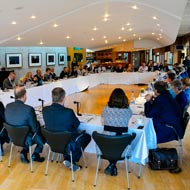
Kit Sturgess asks: do smaller groups lead to better decisions?
Defra is being urged to run a public consultation on changing the governance of the RCVS, after progress so far was formally approved at an historic council meeting in Edinburgh.
Taking place at Scottish Parliament, the meeting was the first in college history to be held outside of its headquarters in London, and incidentally, the first at which council members have not donned the traditional gowns.
Two possible options for future RCVS governance were proposed at the March 2015 council meeting. Option one was to cut the council from 42 members to 20 and up the number of annual meetings from three to six.
An alternative suggestion was to reduce the council to 11 members meeting six times a year, supported by a caucus of 50 members, which meets twice a year. The aim is to bring the RCVS into step with other professional regulators.
A draft consultation package has since been created, but is currently confidential.
During the meeting, councillor Kit Sturgess issued a word of caution with regard to the shrinking of the council and assertions that smaller groups make quicker decisions. He asked if there is any evidence that those decisions are in fact better decisions, or just quicker decisions.
"If we're driving for better governance, then we shouldn't be afraid of saying it may be a slower decision but if the decision is better then that's the way it should be taken," he said.
Chief veterinary officer Nigel Gibbens was present at the meeting, where he stressed the importance of an effective consultation.
"Because we're using the vehicle of a legislative reform order we need to make sure that it isn't contentious, that it does pass through all the various steps it needs to go through smoothly," he said.
On Defra's recommendation, the consultation paper will take a principle-based approach - that is, allowing feedback on each element of the proposals (asking what size should the council be, is there a need for a caucus etc) rather than giving two governance options to choose from, which could limit the responses.
Touching on this at the meeting, Mr Gibbens underlined the importance of a consultation that gives members of the veterinary profession "the best possible chance of an effective input into what then goes forward as regulatory legislative reform."
Professor the Lord Trees urged the council to consider the future of the college and "what sort of college and what sort of governance" is needed to enable its front-end activities.
"Whilst we go forward with the consultation," he added, "I'd just like to make a plea - and I'm looking particularly to the younger members of the council, Tom and Mandisa and others - the future of the college is with you.
"We are at a huge crossroads where this college is going and whilst we consult on governance, let us also take this opportunity to be thinking about our function in the future."
Council members voted to formally approve the process so far and the recommendation to Defra to run a public consultation.
Image © RCVS



 The latest
The latest